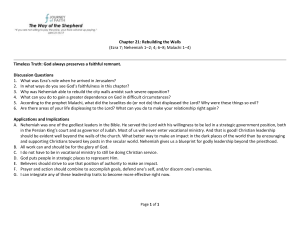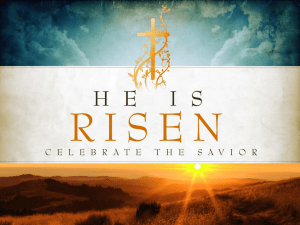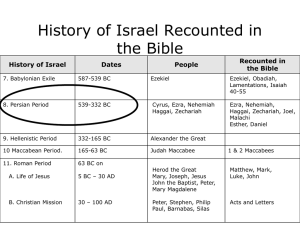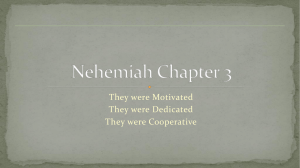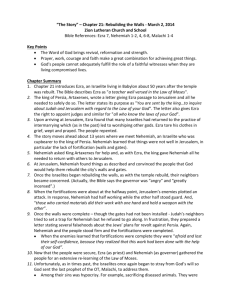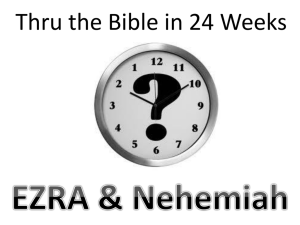Chapter 21
advertisement
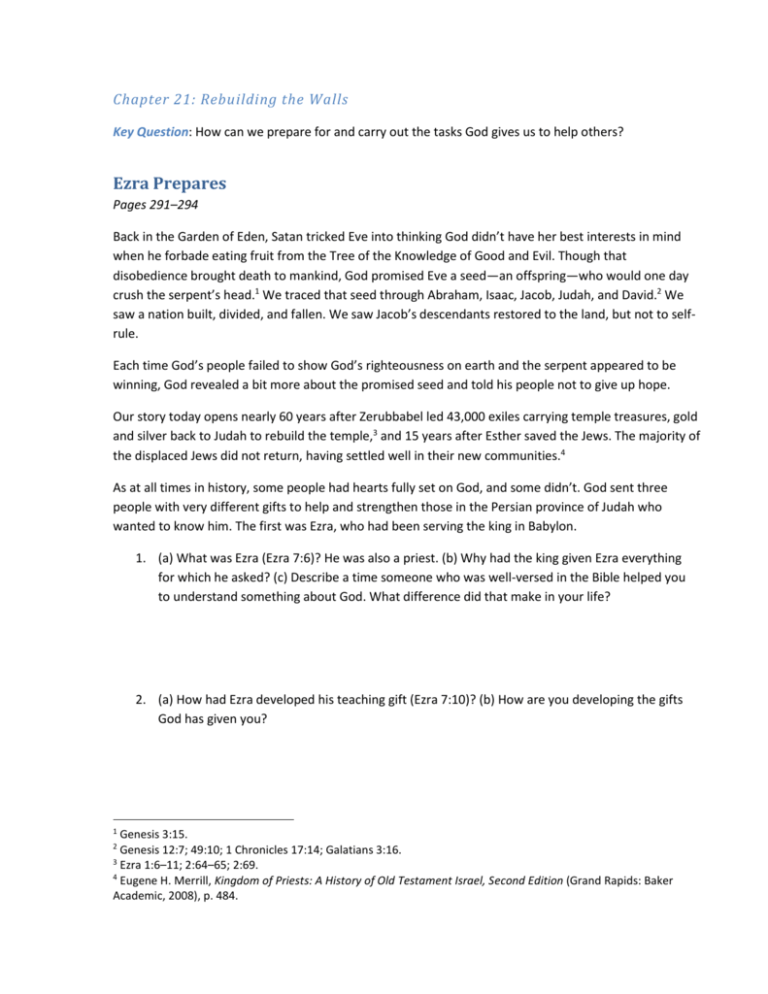
Chapter 21: Rebuilding the Walls Key Question: How can we prepare for and carry out the tasks God gives us to help others? Ezra Prepares Pages 291–294 Back in the Garden of Eden, Satan tricked Eve into thinking God didn’t have her best interests in mind when he forbade eating fruit from the Tree of the Knowledge of Good and Evil. Though that disobedience brought death to mankind, God promised Eve a seed—an offspring—who would one day crush the serpent’s head.1 We traced that seed through Abraham, Isaac, Jacob, Judah, and David.2 We saw a nation built, divided, and fallen. We saw Jacob’s descendants restored to the land, but not to selfrule. Each time God’s people failed to show God’s righteousness on earth and the serpent appeared to be winning, God revealed a bit more about the promised seed and told his people not to give up hope. Our story today opens nearly 60 years after Zerubbabel led 43,000 exiles carrying temple treasures, gold and silver back to Judah to rebuild the temple,3 and 15 years after Esther saved the Jews. The majority of the displaced Jews did not return, having settled well in their new communities.4 As at all times in history, some people had hearts fully set on God, and some didn’t. God sent three people with very different gifts to help and strengthen those in the Persian province of Judah who wanted to know him. The first was Ezra, who had been serving the king in Babylon. 1. (a) What was Ezra (Ezra 7:6)? He was also a priest. (b) Why had the king given Ezra everything for which he asked? (c) Describe a time someone who was well-versed in the Bible helped you to understand something about God. What difference did that make in your life? 2. (a) How had Ezra developed his teaching gift (Ezra 7:10)? (b) How are you developing the gifts God has given you? 1 Genesis 3:15. Genesis 12:7; 49:10; 1 Chronicles 17:14; Galatians 3:16. 3 Ezra 1:6–11; 2:64–65; 2:69. 4 Eugene H. Merrill, Kingdom of Priests: A History of Old Testament Israel, Second Edition (Grand Rapids: Baker Academic, 2008), p. 484. 2 Ezra asked the king to allow him to go to Judah and teach the people how to live according to God’s laws. The king agreed and gave Ezra a letter granting authority, people, and supplies to accomplish his task. 3. (a) For what did Ezra praise the Lord (Ezra 7:27)? (b) Now that the king had given him what he needed, how did Ezra prepare for the task ahead of him (7:28)? (c) Describe a time God called you to do something that required courage. (d) What tasks do you have before you today that require courage? Ezra brought 1,500 men and their families with him to Jerusalem, along with a huge amount of gold and silver donated by the king and others.5 There he soon discovered the city’s leaders had been unfaithful to God. Ezra mourned, fasted, and prayed over the situation. He led the people into confessing sins and repenting. Then he taught them about God, his laws about loving God and loving people, and God’s purpose for the descendants of Abraham. Nehemiah Prepares Pages 294–296 Ezra ministered to the people’s spiritual needs, but they had other needs too. In particular, Jerusalem’s walls were broken down, and in those days, a city needed walls to protect its inhabitants from raiders and other enemies. For these physical needs, God called another gifted leader: Nehemiah. 4. (a) What did Nehemiah do when he heard about the trouble in which Jerusalem’s inhabitants were (Nehemiah 1:4, 6b)? (b) These were the same actions Ezra took when he discovered the problems in Judah and he wanted to know what God would have him do; why do you think this was their first response when encountering a major problem? (c) What can we learn from this? 5 Ezra 8:1–14; 8:24–27. Nehemiah’s heart ached for his people. He wanted to help. But he was the king’s trusted cupbearer and couldn’t take a leave of absence without permission. He decided to present a plan to the king. 5. (a) What did Nehemiah pray before talking to the king? (b) How might the king’s response provide direction as to what God wanted him to do? (c) Briefly describe a time God gave you direction through the response of someone who had the authority to advance something or stop it. The king granted Nehemiah’s request, made him governor of Judah, and gave him everything he needed. Nehemiah Builds Pages 296–299 The Jews’ enemies were angry that Nehemiah was rebuilding Jerusalem’s wall. They wanted them unprotected so they could attack at will. 6. (a) How did they try to stop the work (Nehemiah 4:1–3)? (b) The New Testament tells us we’re in a struggle against the devil and the spiritual forces of evil in the heavenly realm.6 What kind of “protective walls” are you trying to build for yourself, your family, and your areas of ministry? (c) Why don’t your spiritual enemies want you to succeed? (d) Describe any discouraging thoughts you have been encountering as you try to build these walls. How are they similar to Nehemiah’s enemies’ taunts? Might your discouraging thoughts be coming from a spiritual enemy who wants to stop you from your work? 6 Ephesians 6:12. Nehemiah prayed for God to turn the insults back on the insulters, and got back to work. He didn’t let the mocking stop him. When the wall was halfway up, new problems arose. 7. (a) How did the enemies respond to the workers’ progress (Nehemiah 4:7–8)? (b) How did Nehemiah respond back (4:9)? (c) What other problems did the workers face (4:10–12)? (d) Briefly describe any similar challenges you’re facing in your spiritual “wall building.” 8. (a) How did Nehemiah respond to his problems (Nehemiah 4:13–14)? (b) How can you respond like Nehemiah in your spiritual battles? In all, the Jews’ enemies tried to stop the work by using mockery, distractions, threats, intimidation, false accusations, and temptations to compromise. But Nehemiah stayed focused and helped the workers in every way he could. They completed the wall in just 52 days. 9. (a) Why were the Jews able to succeed (Nehemiah 6:16)? (b) Why will you be able to succeed in the things God calls you to do? Ezra Teaches Pages 299–301 Nehemiah completed the wall on October 2, 455 BC. On October 8, Ezra climbed on top a high wooden platform and read God’s word to the people assembled around him. 10. (a) Ezra read from dawn to noon. What did the people do (Nehemiah 8:3)? (b) When Ezra opened the book of the Law and praised God, how did the people respond (8:6)? (c) What did the Levites with Ezra do (8:8)? (d) What can we learn from this? 11. (a) As the people listened to the words, what did they begin doing (Nehemiah 8:9)? (b) What might have been some of the reasons for their tears? (c) Why did Nehemiah tell them not to grieve that day (8:10)? (d) What did he mean by, “The joy of the Lord is your strength”? (e) What did the people then do (8:12)? (f) How can you joyfully celebrate something you’ve learned from God’s word recently? Malachi Exhorts Pages 301–304 As always, not everyone had hearts after God. Eliashib the priest maintained ties with the Jews’ enemies. When Nehemiah returned to his cupbearer job, Eliashib misused the temple and quit giving the Levites their pay. Some Jews ignored the laws Ezra taught them about sacrifices. People stopped keeping the Sabbath holy. Divorce became common, and some married non-Israelite worshippers of other gods.7 God sent the people another prophet: Malachi. 12. (a) Malachi said those who offered defiled animals as sacrifices dishonored God (Malachi 1:6–7), and those who refused to bring the required tithes robbed God (3:6–10). What do those actions tell us about the relationship the people doing these things had with God? (b) What did God hear the people saying about him (Malachi 3:14–15)? (c) What does that tell us about their reason for serving God? (d) What is the difference between serving God only because we think he’ll prosper us on earth, and serving him because we recognize he is the Almighty Creator who loves us? Those who feared the Lord responded well to Malachi’s message, and God promised to remember them. Malachi told the people about a future Day of the Lord. 13. (a) What did God say about those who feared him (Malachi 3:17)? (b) On that coming day, what will everyone see (3:18)? 14. (a) What will happen to the arrogant and evildoers (4:1)? (b) What will happen to those who revere God’s name (4:2)? 7 Nehemiah 13. 15. (a) Whom do you most relate to: Ezra, Nehemiah, or Malachi? Why? (b) How can you prepare for and carry out the tasks God gives you to help others? Yes, God promised Eve a serpent crusher. Next week we meet him.
